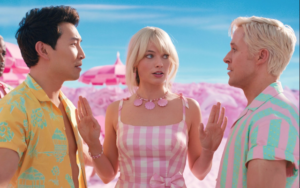BARBIE: 4 STARS. “Hey Everybody! It’s Existential Crisis Barbie!”
 Those expecting “Barbie,” the new battle-of-the-sexes fantasy starring Margot Robbie as the titular doll, to be a two-hour advertisement for Mattel may be shocked to discover that it is actually an esoteric movie about what it means to be human. It’s Existential Crisis Barbie!
Those expecting “Barbie,” the new battle-of-the-sexes fantasy starring Margot Robbie as the titular doll, to be a two-hour advertisement for Mattel may be shocked to discover that it is actually an esoteric movie about what it means to be human. It’s Existential Crisis Barbie!
“Since the beginning of time,” intones narrator Helen Mirren, “since the first little girl ever existed, there have been dolls. But the dolls were always and forever baby dolls, until…” Barbie came along.
By design, the blonde plastic doll with arched feet and optimistic outlook, first introduced in 1959, could be and do anything. “Thanks to Barbie, all problems of inequity and feminism have been solved.”
At least that’s what “stereotypical” Barbie (Robbie) believes.
She lives in the fluorescent Barbieland, a feminine nirvana where “every day is the best day ever. So was yesterday, and so is tomorrow, and every day from now until forever.”
Barbies, like Robbie’s Barbie, and doctor Barbie (Hari Nef), Barbie with a Nobel Prize in physics (Emma Mackey), mermaid Barbie (Dua Lipa), Supreme Court Justice Barbie (Ana Cruz Kayne), president Barbie (Issa Rae), among many others, live in Dreamhouses, without a care in the world.
Along for the ride are Barbie’s platonic friends, the Kens (played by Kinglsey Ben-Adir, Scott Evans, Simu Liu, and Ncuti Gatwa). Barbie may have a great day every day, but lovesick Beach Ken (Ryan Gosling), only has a great day when Barbie looks at him.
It’s mostly all sunshine and dance parties in the candy-colored Barbieland, but lately Barbie is troubled. “Do you ever think about dying?” she wonders aloud.
Just as disturbing, after a fall, her arched feet, perfectly suited to the extra high heels she always wears, have gone flat. “Some things have happened that might be related,” she says. “Cold shower. Falling off my roof. And my heels are on the ground.”
Turns out, there is a rift in the time and space continuum between the doll and the real world. Barbieland’s elder, Weird Barbie (Kate McKinnon), advises Barbie that the only way to resolve her creeping ennui is to visit to the real world and find the little girl who is playing with her. The two are inexplicably intertwined. If the girl is sad, it could be rubbing off on Barbie.
“I’ll be back in no time with perfect feet,” she says, “and it will be like nothing happened.”
Transported to Venice Beach, the real world isn’t exactly what Barbie, and Ken who eagerly tagged along, expected. “No one rests until that Barbie is back in the box,” orders the Mattel CEO (Will Ferrell).
Unlike the doll that inspired the movie, “Barbie” has a big, beating heart. A study in what it means to be alive, to be a woman, feminism, patriarchy and toxic masculinity, it is a hilarious and humanist social satire that may win a world record for the use of the word “patriarchy” on film.
Director Greta Gerwig, who co-wrote the script along with Noah “The Squid and the Whale” Baumbach, takes a maximalist approach in creating Barbie’s thermonuclearly pink world. It’s a perky and playful take on her life, like a Barbie Dreamhome brought to magical life. It leans heavily into Mattel lore and is sure to stoke feelings of nostalgia for Barbie-heads. “I’m the Barbie you think of when someone says ‘Barbie,’” she says.
But as Barbie leaves behind the superficial life she knew before, her head fills with something unfamiliar; a flood of feelings. Her exposure to subjugation and objectification in a world opposite of the feminist utopia of Barbieland—“Basically everything men do in your world,” she says, “women do in mine.”—has a profound effect on her self-identification. She may still dress like “Hot Skatin’ Barbie” but her outlook has changed, she now craves meaning in her life, to understand who she really is.
Robbie brings breathes life into Barbie’s journey in a fully committed performance that is often as hilarious as it heartfelt. In a more comedic role, Gosling steals the picture as Ken, a soppy, dim-witted guy whose exploration of misogyny takes up much of the film’s last half.
“Barbie” is not your typical summer blockbuster, or your regular toy-based movie. It is both those things, of course, but it somehow finds a way to push back and be its own plastic and political thing. It has both style and substance, and while its story may get overactive and muddled in its last reel, Gerwig’s point of view on gender roles and the way that women are treated in society pulls few punches.
